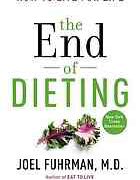The End of Dieting: How to Live for Life. / Joel Fuhrman, 2014. HarperOne. 314 pages.

Eat to Live, referring to the title of this post and to the title of an earlier publication by Fuhrman, is such an appropriate phrase. We all want our food to taste delicious and we want to eat well while not worrying about our waistlines. In such a state of affairs, we have many options—yet the ones that really work are not as obvious as you’d think. For over a decade, the author focus of this post has proposed how well and deliciously we can eat and lose weight, too.
You simply need to choose your food wisely.
A prolific author, medical doctor Joel Fuhrman describes the food we eat and what it does to our bodies. His tone and language, though, among the many other dieter’s plans, is the kindest. He puts the science about food components into perspective yet he places “diet” outside the realm of necessity because all the food he proposes we eat is whole and good for you.
In other words, if you want to lose weight, eat to live by choosing the right food stuffs and avoiding the refined and manufactured foods.
One of the factors in weight gain, aging, and disposition towards disease, is something we manufacture internally from the foods we ingest. It’s the IGF-1 factor, or “insulin-like growth factor 1”, and we produce the most of it from animal products, including meat and dairy. Refined carbohydrates also contribute to IGF-1, speeding up cell growth the way insulin does with its capacity to induce cell mitosis.
Notice that not only meat and carbohydrates, but also refined carbohydrates should be completely avoided. Of course, these foods are not nowadays featured on any healthy diet plan. In other words, most healthy diets remind us that whole foods—foods in their unprocessed forms—are the healthiest, indeed the only kinds of foods we should eat.
Dr. Fuhrman doesn’t believe in counting calories and he proposes that we get used to assessing food for its high density and overall nutritional value which includes vitamins and minerals in addition to protein, carbohydrates and fats.
But the main idea, rather than restricting caloric intake, is to limit or entirely avoid refined carbohydrates, and meats and milk products.
In his earlier work, “Eat to Live”, on page 115, Fuhrman describes the kinds of foods which are carbohydrates and which ones are good for you because their nutrient density is high. He says:
Fresh fruits, beans and legumes, whole grains and root vegetables are all foods whose calories come from carbohydrates…He says that those fresh fruits, beans and legumes, whole grains and root vegetables that are full of fiber, may have higher amounts of carbohydrates, but since fiber is not digestible, the calories from them do not count.
By following this author’s advice to get your energy from whole food sources, you get ample carbohydrates and the energy they generate. Fuhrman cites beans and legumes as premier whole food sources of this mega-nutrient. By avoiding refined carbohydrates entirely, and instead indulging in whole food carbohydrates, you forgo the ones that are likely to cause trouble for your health.
So, you can eat all your heart desires of those whole foods! And it’s not necessary to count how many calories you are consuming. Imagine that! What freedom—and you will lose weight and be a whole lot healthier.
Follow


